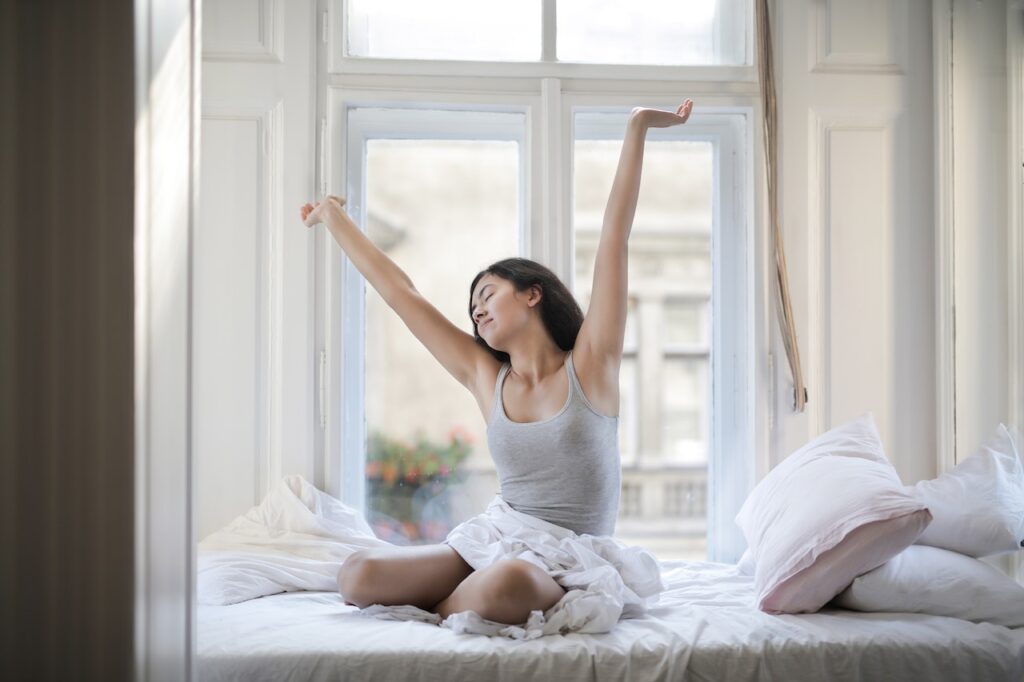Before we get started let’s first clear something up. There is nothing wrong with being a night owl! Despite society often portraying early birds in a more positive light and the misconception that they are more productive than night owls, this isn’t actually correct.
If you struggle with mornings and find you do your best work later in the evenings, there’s nothing wrong with you, it’s just who you are. That doesn’t mean it’s not practical though. The fact of the matter is, the world isn’t really designed for night owls and you could be compromising a good night’s sleep to stay up late.
Finding a way to get yourself up and out of bed in the mornings and still being a night owl is not the simplest of feats, but it is doable. It’s less about going to bed and waking up, and more about what you’re doing in between those hours.
Why are you a night owl?
Your sleep cycle is controlled by something called the circadian rhythm. When you prefer to go to sleep is your circadian typology, meaning some people are naturally programmed to go to bed later and wake up later. You can’t be both an early bird and a night owl, and making the transition from one to the other isn’t as simple as just going to sleep earlier.
Your circadian rhythm is influenced by your external triggers and social interactions. When and what you eat, how much exercise you do, and how much time you spend in natural light all stimulate changes in your circadian rhythm, and can interfere with your pre-set body clock. That means making some lifestyle changes could help you to get up in the mornings, even if you are naturally a night time person.
However, if you are feeling tired but STILL can’t fall asleep, and therefore struggling to get out of bed, this might not necessarily be down to your genetic programming after all. Delayed Sleep Phase Disorder (DSPD) is effectively a glitch in your internal body clock, meaning your sleep-wake pattern is delayed by approximately two hours from what is considered a conventional sleeping pattern (even if you’re a night owl!). It’s most common in teens and young adults but can affect anyone. If you’re struggling to fall asleep no matter what time you go to bed, there’s a chance you could be suffering from DSPD and be putting your trouble sleeping down to your night owl tendencies.
The truth is, whether you’re a night owl, an early bird, or somewhere in between, if you’re feeling tired throughout the day and can’t get out of bed in the morning then something needs to change. In order to be firing on all cylinders and be your most productive and creative self, you need to be getting enough sleep, and GOOD sleep at that. Transitioning from being a night owl to an early bird isn’t something that can happen overnight (pardon the pun) but there are lots of small changes you can make to start making the early mornings easier, without jeopardizing your sleep!
Tips for getting out of bed when you’re a night owl
Ever heard the phrase ‘the early bird gets the worm’? Whilst this isn’t strictly correct, as it implies that night owls are unproductive, it is true for those who get a good night’s sleep. If you’re someone who struggles waking up in the mornings and wants to know how to get up earlier, even if you’re a night owl, here are some small changes you can make to motivate yourself and make mornings something to look forward to.
Give yourself a reason
Waking up at sparrow-fart for absolutely no reason is going to make finding the motivation to drag yourself out of bed when the alarm goes off really hard. When there’s no urgency or something to look forward to, it’s much easier to keep hitting the snooze button until you’ve stayed in bed until midday. Your why needs to be greater than your why not, which in this case is a warm, comfy bed and nowhere to be right away, so start finding reasons. Change the mental narrative from I should really get up early tomorrow to I want to get up early tomorrow.
Be realistic
Becoming a morning person when you’re instinctively a night owl is not a quick fix and will take time to get into a routine and rewire your internal body clock. It’s unrealistic to think you can change it overnight and spring out of bed in the morning after going to bed earlier one time. Set the alarm earlier each morning in increments, rather than shocking your system with a blaring noise at 6 am.
The problem with simply waking up earlier when you’ve had a late night is that it interrupts the most important part of your sleep cycle– REM sleep. Your brain needs this time to rest and reset, so giving it a hard start before it’s had a chance to recover will be doing more harm than good. Over time, a lack of proper sleep will build up and can lead to some significant physical and mental health complications.
Instead of simply setting your alarm for a few hours earlier, set it for a few minutes earlier each morning. This could be in small increments of 5 minutes or larger gaps like 20 minutes. Whatever it is, make sure you’re off-setting it with a slightly earlier night too to allow your brain the time it needs to rest.
Be kind to yourself
As with anything involving breaking a habit or starting a new one, you’re going to have setbacks. There will be mornings where you really just don’t feel like getting up and you hit snooze a few times. Don’t beat yourself up for doing so, it’s probably your body’s way of letting you know it needs more time to rest.
Get enough natural light during the day
One of the tricks to shifting your sleep cycle and getting up earlier is exposing yourself to enough natural light. Getting enough bright light earlier in the morning will help to shift your body clock forwards and start preparing you for sleep earlier in the evening.
Light intensity is measured in lux, with 10,000 lux being the intensity you’d get outside on a sunny day. If you live in a cloudy country or somewhere with less bright sunlight, scientists recommend getting outside for at least 2 hours in order to give your body enough light to trigger your sleep cycle.
Track your mood
Humans are inherently terrible at recognising long-term changes. Try tracking your mood, energy levels, emotions, etc to see how a change in your sleep cycle is affecting you. Journaling is a great mechanism to not only track the changes but also practice mindfulness and keep your mental health in check. Enough sleep should lead to an improved mood, memory, creativity, and impulse control.
Have a healthy bedtime routine
Also known as sleep hygiene, having a healthy bedtime routine is a fantastic way to get your brain and body ready for bed earlier. Having a set routine that you go through, whether it’s showering and doing some self care skin care, or reading your favourite book on the sofa with a brew (caffeine free of course), will help your brain to wind down and prepare yourself for a restful sleep.
As we mentioned above, journaling can be incorporated into your night-time routine to not only track your mood and energy levels throughout the day but to keep yourself grounded and feeling your best. By practicing gratitude, writing down your goals and aspirations, as well as some quick affirmations, you can make sure you’re going to bed feeling your very best, in order to wake up feeling just as good.
Switch up your eating and drinking habits
Eating heavy meals later in the evening, drinking caffeine throughout the afternoon, or consuming alcohol before you go to bed are all going to stop you from falling asleep at a decent time and make it hard to wake up earlier the following morning.
By eating late in the evening, your body must work hard to digest your food whilst you’re lying down which makes it a little more difficult. This can result in heartburn or indigestion which is uncomfortable enough to prevent you from getting to sleep. It also requires your body to keep working hard to break up the big meal which can prevent you from being able to settle enough to fall asleep. If you need to eat late at night, opt for a light, small meal or a snack to give yourself the best chance.
At the end of the day, it’s important to remember that night owls are NOT lazy or unproductive, even if society portrays it as such. Many entrepreneurs, celebrities, and public figures spend an awful lot of time telling everyone how early they get up, so naturally, it will make those who value a good lie-in feel at a disadvantage. But the fact of the matter is, that no matter what time you go to bed or wake up, you are getting enough sleep to keep your body healthy and your brain working at its full capacity.
Looking for a new way to boost your mental health? Why not download the Morale app? By installing our app, you can send those in your network daily anonymous affirmations to keep their spirits high and their self esteem in check. And what’s even better, by sharing positive vibes with those in your inner circle, your mental health will receive a boost too! Helping others helps us in return, so start sharing positive affirmations and support not only your friends and family but yourself too.
The Morale app is available for download now from Google Play or Apple’s App Store.
The good vibes are flowing over on our social media! Head to our pages and hit follow to make sure you don’t miss out on anything.
Got some feedback for us? We’re all ears, simply send us an email to contact@moraleapp.co and we’ll read what you’ve got to say.











